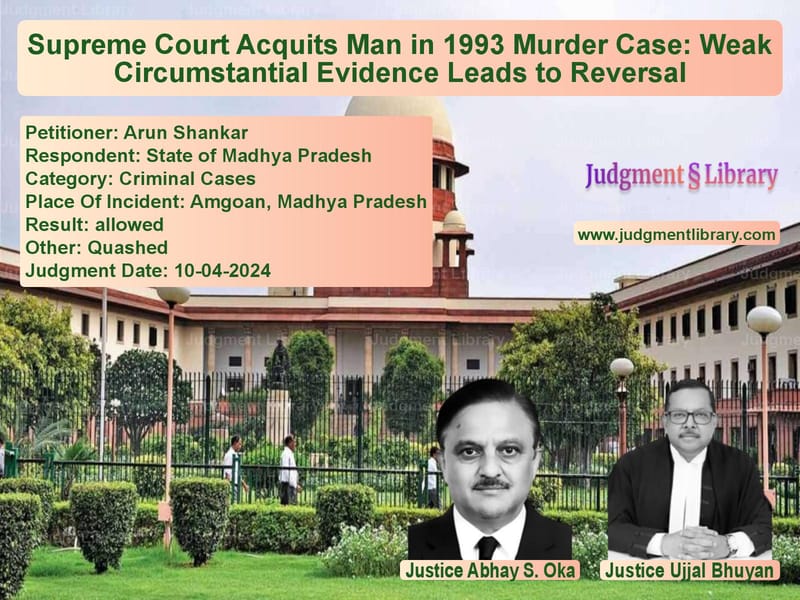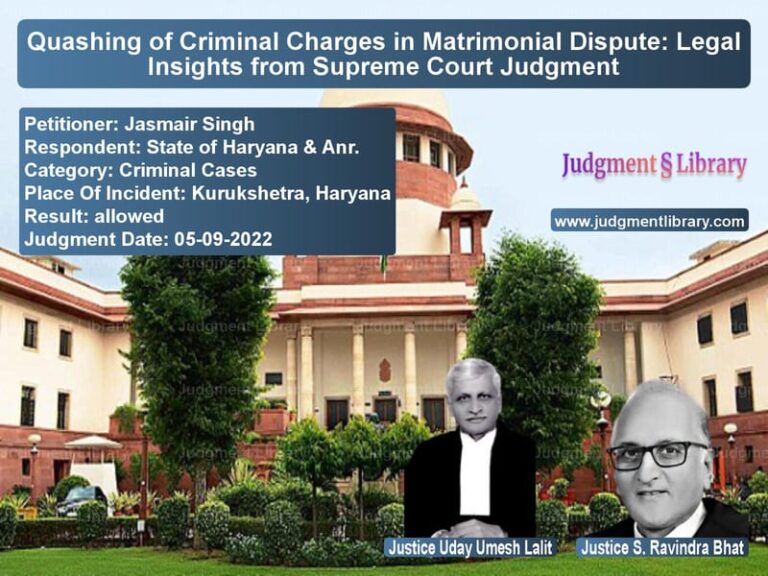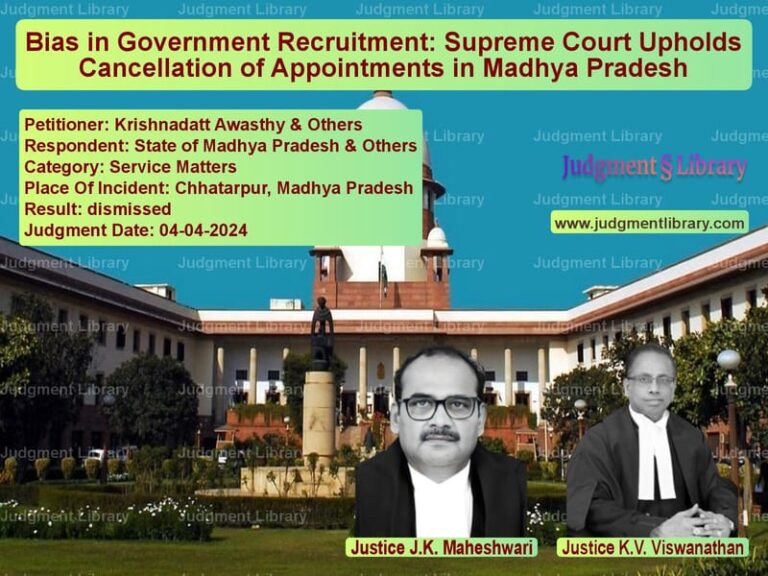Supreme Court Acquits Man in 1993 Murder Case: Weak Circumstantial Evidence Leads to Reversal
The Supreme Court of India, in a recent landmark judgment, acquitted Arun Shankar in a 1993 murder case, ruling that the circumstantial evidence presented by the prosecution was insufficient to sustain a conviction. The ruling emphasizes the importance of a fair trial, highlighting that in cases relying solely on circumstantial evidence, the chain of events must be complete and lead to only one conclusion: the guilt of the accused. This case serves as a vital precedent for future criminal trials, reinforcing that mere suspicion, however strong, cannot replace concrete proof.
Background of the Case
The case pertains to the alleged murder of Sushildhar Dubey, who was last seen drinking with the appellant, Arun Shankar, on the night of September 29, 1993. The next morning, Dubey’s body was discovered on a road leading to the village of Bijholidhar Amgoan. The prosecution heavily relied on circumstantial evidence to establish the appellant’s involvement in the crime.
- The trial court convicted the appellant under Sections 302 and 201 of the Indian Penal Code (IPC) and sentenced him to life imprisonment on March 13, 1995.
- The conviction was upheld by the Madhya Pradesh High Court on December 5, 2017.
- The Supreme Court, however, found significant inconsistencies in the evidence and overturned the conviction.
Prosecution’s Case
The prosecution’s case was built on the following circumstantial evidence:
- The deceased was last seen with the appellant on the night of September 29, consuming alcohol.
- The post-mortem report suggested that Dubey suffered a fatal head injury, allegedly caused by a sharp object.
- The appellant allegedly led the police to the discovery of a blood-stained knife, claimed to be the murder weapon.
- The prosecution contended that the appellant had a prior altercation with the deceased, which provided motive.
Defense’s Case
- The appellant denied any involvement in the murder and stated that he left the deceased after their drinking session.
- The defense highlighted that no eyewitnesses directly linked the appellant to the crime.
- The reliability of the last-seen-together theory was challenged, arguing that mere presence does not establish guilt.
- The defense pointed out discrepancies in witness statements regarding the alleged recovery of the knife.
Key Observations of the Supreme Court
- The Court reaffirmed the principle established in Sharad Birdhichand Sarda v. State of Maharashtra, emphasizing that circumstantial evidence must form a complete chain leading to only one conclusion: the guilt of the accused.
- It found that the last-seen-together theory was weak, particularly since the appellant and the deceased were acquaintances who often consumed alcohol together.
- The prosecution failed to establish motive, further weakening its case.
- The alleged recovery of the murder weapon was deemed unreliable, as key witnesses contradicted each other.
- The Court noted that the presence of glass pieces at the crime scene suggested an accidental fall or an unrelated incident.
Judicial Precedents Considered
- Sharad Birdhichand Sarda v. State of Maharashtra: The Court reiterated that suspicion, no matter how strong, cannot take the place of proof in a criminal case.
- Nagaraj v. State of Tamil Nadu: The Court had previously ruled that weak circumstantial evidence cannot be the sole basis for conviction.
- Ram Gopal v. State of Uttar Pradesh: This case established that any failure in proving a complete chain of evidence should lead to acquittal.
Final Judgment
The Supreme Court allowed the appeal and issued the following directives:
- The appellant’s conviction was set aside.
- He was acquitted of all charges.
- His bail bonds were canceled, and no further legal action would be pursued against him.
- The Court directed that in future cases, trial courts must scrutinize circumstantial evidence with greater rigor.
Implications of the Judgment
- The ruling reinforces the requirement for strong circumstantial evidence in murder cases.
- It sets a precedent that weak last-seen-together theories cannot be the sole basis for conviction.
- The judgment protects individuals from wrongful convictions based on inadequate evidence.
- It highlights the importance of proper forensic analysis and reliable witness testimony in criminal trials.
- The ruling will likely be cited in future cases where convictions are based solely on circumstantial evidence.
Critical Analysis
This case sheds light on several key issues in criminal jurisprudence:
- The Role of Forensic Evidence: The absence of DNA testing or forensic linking of the accused to the weapon weakened the prosecution’s case.
- Delay in Legal Proceedings: The case took over 30 years to reach its conclusion, raising concerns about delayed justice.
- Standard of Proof in Criminal Cases: The case underscores that the burden of proof lies with the prosecution and cannot be diluted.
- Presumption of Innocence: The judgment reaffirms that every individual is presumed innocent until proven guilty beyond reasonable doubt.
Conclusion
The Supreme Court’s decision in Arun Shankar v. State of Madhya Pradesh is a landmark ruling that reinforces the importance of fair trial principles. By setting aside the conviction due to weak circumstantial evidence, the Court has ensured that no individual is punished without conclusive proof of guilt. This ruling serves as a reminder that courts must rigorously scrutinize evidence before convicting an accused based on circumstantial evidence alone.
The judgment also highlights the need for a stronger legal framework to prevent wrongful convictions and ensure that forensic evidence plays a more central role in criminal trials. In an era where technological advancements can provide more accurate evidence, reliance on weak circumstantial links must be minimized.
For legal practitioners, this case serves as an essential precedent in defending accused individuals against wrongful conviction. It reinforces that courts must base their rulings on robust and unassailable proof, ensuring that justice is not only done but seen to be done.
Petitioner Name: Arun Shankar.Respondent Name: State of Madhya Pradesh.Judgment By: Justice Abhay S. Oka, Justice Ujjal Bhuyan.Place Of Incident: Amgoan, Madhya Pradesh.Judgment Date: 10-04-2024.
Don’t miss out on the full details! Download the complete judgment in PDF format below and gain valuable insights instantly!
Download Judgment: arun-shankar-vs-state-of-madhya-prad-supreme-court-of-india-judgment-dated-10-04-2024.pdf
Directly Download Judgment: Directly download this Judgment
See all petitions in Murder Cases
See all petitions in Bail and Anticipatory Bail
See all petitions in Custodial Deaths and Police Misconduct
See all petitions in Judgment by Abhay S. Oka
See all petitions in Judgment by Ujjal Bhuyan
See all petitions in allowed
See all petitions in Quashed
See all petitions in supreme court of India judgments April 2024
See all petitions in 2024 judgments
See all posts in Criminal Cases Category
See all allowed petitions in Criminal Cases Category
See all Dismissed petitions in Criminal Cases Category
See all partially allowed petitions in Criminal Cases Category







